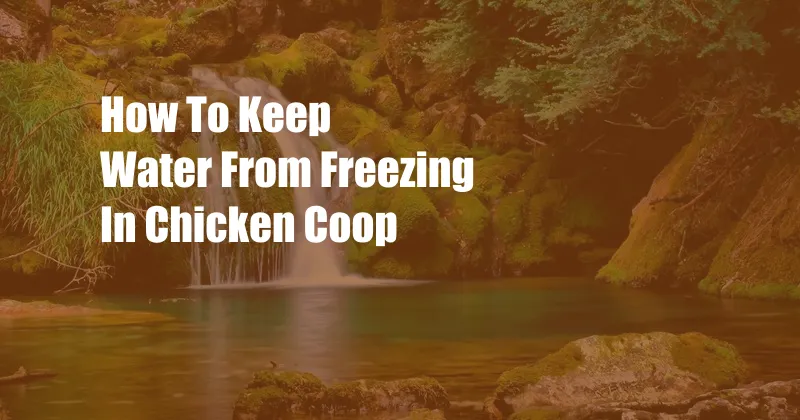
How to Prevent Water from Freezing in Chicken Coops: A Comprehensive Guide
As a seasoned chicken keeper, I know firsthand the importance of providing a comfortable and healthy environment for my feathered friends. One crucial aspect of their well-being is ensuring they have access to clean, unfrozen water, even during the coldest winter months. Freezing water can lead to dehydration, health issues, or even death for your chickens.
Fortunately, there are numerous effective methods to keep water from freezing in chicken coops, ensuring a steady supply of fresh water for your flock throughout the year.
Automatic Water Heaters
Automatic water heaters are a convenient and reliable solution for preventing water from freezing in chicken coops. These devices immerse a heating element into the water, maintaining a constant temperature above freezing, regardless of the outside conditions.
When choosing an automatic water heater, consider the size of your coop, the number of chickens, and the severity of the winter weather in your area. Choose a heater with sufficient wattage to prevent freezing even in extreme cold.
Insulated Waterers
Insulated waterers are another effective way to prevent water from freezing. These waterers have double-walled construction, with an insulating layer between the walls to reduce heat loss.
Insulated waterers can be made of various materials, such as plastic, metal, or ceramic. When selecting an insulated waterer, choose one that is durable, easy to clean, and has a tight-fitting lid to minimize heat loss.
Heated Chicken Coops
Heating the entire chicken coop is an effective solution for keeping water and your chickens warm during winter. By maintaining an ambient temperature above freezing, you eliminate the need for individual water heaters or insulated waterers.
Various heating systems can be used to heat chicken coops, including radiant heaters, infrared heaters, or wood stoves. Choose a heating system suitable for the size of your coop and the climate in your area.
Tips and Expert Advice
Here are some additional tips and expert advice to keep water from freezing in chicken coops:
- Use a larger waterer: A larger waterer has a greater surface area, which slows down heat loss.
- Position the waterer in a sheltered area: Place the waterer in a draft-free area of the coop, away from windows or doors.
- Add a ping-pong ball: A ping-pong ball floating on the surface of the water agitates it, preventing ice from forming on the surface.
In addition to these tips, ensure you monitor your waterers regularly during cold weather. If ice forms, remove it promptly to prevent your chickens from drinking contaminated water.
FAQs
Q: Can I use a heated blanket to keep the water from freezing?
A: While heated blankets can provide some insulation, they are not a reliable solution for preventing water from freezing in chicken coops. The heat may not be evenly distributed, and the blanket can pose a fire hazard if not used properly.
Q: Can I add salt to the water to prevent freezing?
A: Adding salt to the water is not recommended as it can be harmful to chickens if ingested in large quantities. Salt can also damage waterers and heating elements.
Conclusion
By understanding the different methods and techniques to prevent water from freezing in chicken coops, you can ensure a constant supply of fresh, unfrozen water for your flock throughout the winter months. With proper care and attention, your chickens can stay hydrated and healthy even in the coldest of conditions.
Are you interested in learning more about how to keep your chickens comfortable and healthy in winter? Visit our website for more articles, tips, and resources.